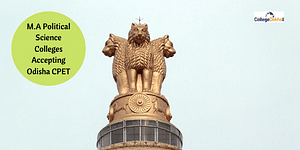BA in English Syllabus & Subjects 2025
BA English subjects & syllabus are around 43 in number. Candidates will study the course in 6 semesters covering everything related to Communicative English, Popular Literature, Indian Writing in English, British Romantic Literature, Modern European Drama, Academic Writing, and much more.
BA English Syllabus & Subjects Overview 2025
BA English Subjects & Syllabus 2025 include British, American, and Indian literature, linguistics, literary theory, drama, poetry, and fiction. A Bachelor of Arts (BA) in English is a three-year undergraduate degree that focuses on literature, language, and critical analysis. It is designed for students interested in exploring the richness of English literature, from classic works to contemporary writings. The program covers poetry, prose, drama, literary theory, linguistics, and cultural studies. Students engage with works from British, American, Indian, and world literature, analyzing themes, historical contexts, and stylistic elements. The course also includes academic writing, translation studies, and gender studies, enhancing interpretative and communication skills.
BA English graduates develop strong writing, research, and critical thinking abilities, making them well-suited for careers in journalism, publishing, teaching, content writing, and media. Many also pursue higher education in literature, linguistics, or creative writing.
BA in English Subjects & Syllabus is designed to provide students with a deep understanding of literary history, major literary movements, and influential writers from different periods and regions. In the first year, students are introduced to classical and medieval literature, Indian writing in English, and communication skills. The second year focuses on British, American, and world literature, along with literary criticism. The final year includes modern and contemporary literature, postcolonial studies, and elective courses that allow specialization in areas like creative writing or linguistics. The course enhances analytical thinking, research skills, and creative expression, making it ideal for careers in writing, teaching, publishing, media, and research. It provides a strong foundation for higher studies in literature and linguistics.
Table of Contents
- BA English Syllabus & Subjects Overview 2025
- BA English Syllabus & Subjects Highlights
- Semester Wise BA English Syllabus 2025
- BA English Subject List
- BA English Core Subjects
- BA English Optional Subjects
- BA English Syllabus for Distance Learning
- BA English Course Structure
- BA English Teaching Methodology
- BA English Entrance Exam Syllabus
- BA English Important Books
- FAQs about B.A. English Syllabus
BA English Syllabus & Subjects Highlights
BA English syllabus and subjects include Media and Communication Skills, Language and Linguistics, Contemporary India: Women and Empowerment, Academic Writing and Composition, Travel Writing, Autobiography, and many others. American Literature, European Classical Literature, and Indian Classical Literature are also included. BA English syllabus also provides students with additional specialties to help them strengthen their skill development and land lucrative employment opportunities in the BA English field.
Here are the highlights of the BA English syllabus and subjects:
| Particulars | Details |
|---|---|
| Course Name | BA English |
| Course Duration | 3 years |
| Total Semesters | 6 |
| BA English Core Subjects |
|
| BA English Elective Subjects |
|
Also Read: Top Delhi University Colleges 2025: NIRF Rankings & Score
Semester Wise BA English Syllabus 2025
BA English syllabus is designed to provide students with a comprehensive understanding of the subject. It covers the history of English literature, language studies, English as a communication tool, and literature from different periods and cultures. Additionally, the course helps develop writing and analytical skills, ensuring a strong foundation in English studies. Refer to the table below for the semester-wise breakdown of the BA English syllabus.
First Year BA English Subjects (Semester 1 & 2)
Communicative English: It is a method of language teaching in which students learn through real-life interactions, which helps to reinforce the importance of learning.
Professional Communication: Professional communication is a subfield of communication that focuses on the theory and practice of communication in a business setting.
Cultural Education: It is the character development through cultural forms of expression, art, and play. It is general education because it allows children and youth to connect with themselves and the world through play, the arts, and culture.
Second Year BA English Subjects (Semester 3 & 4)
Indian English Literature: Indian English literature is the collection of works by Indian English authors.
Poetry: Works of famous poets and authors will be deciphered as a part of this course.
American Literature: Students will study the field of American literature, which encompasses all works produced in the United States, including novels, short stories, plays, poetry, biographies/autobiographies, histories, essays, and literary criticism.
Shakespeare Comedies: Some of Shakespeare's most famous comedies include All's Well That Ends Well, As You Like It, The Comedy of Errors, and others.
Third Year BA English Subjects (Semester 5 & 6)
Literary Criticism Elements: Archetypal criticism, cultural criticism, feminist criticism, psychoanalytic criticism, Marxist Criticism, New Criticism, New Historicism, post-structuralism, and reader-response criticism are all elements of literary criticism.
Spiritual Literature: Spiritual works portray the author's personal spiritual experience. It could be diary excerpts or autobiographies. These works delve into themes of enlightenment, inner peace, and the meaning of life.
English Drama: Drama portrays fictional or non-fictional events through written dialogue. Also known as plays and their authors are known as 'playwrights'.
BA English Subject List
A wide range of BA English syllabi and subjects is taught in universities and colleges in India. The BA English subjects include European Classical Literature, American Literature, Indian Classical Literature, Elizabethan Literature, Post-Colonial Literature, Women’s Writing, etc. Each of the subjects covers extensive studies. All forms of poetry, prose, dramas, and English writing are usually incorporated into the BA English syllabus. All the subjects of this course provide the requisite know-how on the social, political, and economic life of the era the literary works belong to.
Consequently, the students can form a clear perspective on the social and cultural changes that inspired the written works. After completing the 3 years journey, the learners achieve the skills of communication, critical reading, and writing. The specific subjects of the BA English syllabus vary and the basic topics covered are large in number.
Included are some of the basic subjects that are covered under the BA English syllabus are:
| Indian Classical Literature | European Classical Literature |
|---|---|
| American Literature | Indian Writing in English |
| British Poetry and Drama: 14th to 17th Centuries | British Poetry and Drama: 17th & 18th Centuries |
| Popular Literature | Indian Writing in English |
| British Literature: 18th Century | British Romantic Literature |
| Modern European Drama | British Literature: The Early 20th Century |
| Postcolonial Literature | Women’s Writing |
| Communicative English | Autobiography |
| Academic Writing | Travel Writing |
BA English Core Subjects
The BA English (Core) program typically covers literature, language, and critical analysis. The core subjects may vary slightly depending on the university, but generally include:
- English Literature
- Literary Theory & Criticism
- Linguistics & Phonetics
- Drama, Poetry & Fiction
- Indian & Regional Literature
- Academic & Creative Writing
- Literature & Society
- Professional Communication & Soft Skills
BA English Optional Subjects
The optional subjects in the BA English course play a vital role in enriching the overall syllabus. Alongside core subjects, these electives expand students' learning pathways, offering a more comprehensive academic experience. The core and optional subjects complement each other, allowing students to develop a well-rounded understanding of literature and language.
Elective subjects provide opportunities to explore specialised writing skills, such as academic writing, travel writing, and creative writing. These skills prepare students for diverse career opportunities in writing and communication. By studying these subjects, students learn how to effectively express their thoughts and emotions through words. Additionally, critical thinking, creativity, and analytical skills are nurtured, enhancing their intellectual growth.
Since elective subjects are chosen based on individual interests, students should carefully consider their options. They must be aware of the purpose, scope, and learning outcomes of both the core and elective subjects in the BA English syllabus to make informed decisions.
Below is a list of common optional subjects offered in the BA English program:
· Text and Performances
· Literary Theory
· Research Methodology
· Travel Writing
· Autobiography
· Academic Writing and Composition
· Readings on Indian Diversities and Literary Movements
· Modern Indian Writing in English Translation
· Literary Criticism
BA English Syllabus for Distance Learning
BA English syllabus for distance programs is important for the students of the BA English Distance learning program. Instead of regular classes, students in this mode of learning attend classes at flexible times. The BA English syllabus for the distance program is designed to enable students to secure a prospective career in the field. The course topics are chosen based on future scopes. BA English course subjects in distance education are varied. Different universities teach different subjects keeping the core concepts similar to each other. Like the regular courses, the BA English subjects cover different genres like prose, poetry, novel, drama, etc. In some universities, students are taught the concepts of the structure of modern English as well. English Communication skills are an important part of the BA English distance education syllabus.
Listed below are the syllabus topics that a BA English distance education student is required to study during the course:
| BA English Syllabus for Distance Learning - Semester 1 | |
|---|---|
| Background to the Study of English Literature I | Language |
| Indian Writing in English | British Literature I |
| English | - |
| BA English Syllabus for Distance Learning - Semester 2 | |
| Background to the Study of English Literature II | British Literature II |
| English | Language |
| Regional Indian Literature in Translation | - |
| BA English Syllabus for Distance Learning - Semester 3 | |
| British Literature III | Digital Literacy: Concepts and Skills |
| English | Language |
| Modern English Language and Usage | - |
| BA English Syllabus for Distance Learning - Semester 4 | |
| American Literature I | English |
| Film and Literature | Indian Constitution |
| Language | - |
| BA English Syllabus for Distance Learning - Semester 5 | |
| American Literature II | Environmental Studies |
| Introduction to Translation Studies | Post Colonial Literature in English I, Australian Literature |
| Women’s Writing | - |
| BA English Syllabus for Distance Learning - Semester 6 | |
| Contemporary Literature | Post–Colonial Literature in English II |
| Canadian Literature | Shakespeare |
| Value Education | World Literature in Translation |
Also Read: Best Certificate Courses in India
BA English Course Structure
Like the BA English syllabus, the structure of the course also varies for different universities. The course structure is designed in such a way that the students can read about the works of different authors across the world. A wide range of topics is taught across the universities ranging from the literature of the Victorian age to contemporary literature.
Apart from that, the BA English syllabus covers the teaching of advanced writing techniques too. With the learning of the writing procedures, students develop the skill to achieve fineness in writing. They learn about the writing techniques used in different industries. The course structure of BA in English includes the following aspects:
· Semesters
· Core Subjects
· Optional Subjects
· Writing/ Translation/ Language
BA English Teaching Methodology
The BA English subjects remain consistent across colleges, albeit with slight variations in the course modules. The subject order may differ based on the mode of instruction, but the content remains the same. The program offers a distinctive teaching and writing style, along with diverse literary options. Assessments typically include assignments, studying course module books, engaging in case studies or research work, and internship opportunities.
BA English Entrance Exam Syllabus
Entrance Exams aim to assess the student's aptitude for the subject. It is conducted nationally and at the university level. Some colleges consider national-level scores, while others prioritize university-level scores. CUET is a significant national-level exam for BA English admission. Certain universities require candidates to take the English/General Test of the CUET for BA English courses. Thus, it becomes necessary for candidates to understand the BA English Entrance Exam Syllabus.
Here is a list and syllabus of different entrance exams that aspirants can take to pursue a BA English program:
| Entrance Exam | Description | Entrance Exam Syllabus |
|---|---|---|
| CUET | The Central University Entrance Test (CUET) is a centralised exam organised by the National Testing Agency (NTA) for admission to undergraduate programs in various central universities throughout India. Beginning in 2023, CUET has become the essential pathway for securing admission to BA English programs in several universities. | CUET Syllabus |
| IPU CET | The Indraprastha University Common Entrance Test (IPU CET) for Bachelor of Arts (Honours) English 2023 is the entrance exam for admission to the BA English program. It is conducted by Guru Gobind Singh Indraprastha University. | IPU CET Syllabus |
| MH CET | The Maharashtra Common Entrance Test (MH CET) is a pathway to enrol in a BA English program in multiple colleges across Maharashtra, including Mumbai University. This state-level entrance exam is organized by the State Common Entrance Test Cell, Maharashtra. | MH CET Syllabus |
BA English Important Books
Books play a crucial role in the BA English course, offering in-depth knowledge across various subjects. The BA English syllabus includes books from multiple genres, covering prose, poetry, drama, novels, and the history of English literature. Each book serves a unique purpose, providing valuable insights into different literary movements, themes, and writing styles.
By studying these books, students gain subject-specific expertise, which helps them excel in exams while also enhancing their critical thinking and analytical skills. Additionally, these books deepen students’ understanding of the subject, fostering a strong literary aptitude.
Reading drama, for instance, helps students understand the social and historical contexts in which a play was written. Similarly, prose, poetry, and novels reflect the characters, ideas, and societal structures of their time. This allows students to grasp the perspectives, emotions, and messages that writers aim to convey through their works.
Below is a list of essential books from different genres that students study as part of the BA English syllabus:
| Particulars | Book Name | Author/Publisher |
|---|---|---|
| Books on English Literature | English Literature | Edward Albert |
| A History of English Literature | Satish Kumar | |
| Books on Philology | Growth and Structure of the English Language | Otto Jespersen |
| The English Language | C.L. Wren | |
| Drama | Macbeth | William Shakespeare |
| As You Like It | William Shakespeare | |
| Edward II | Christopher Marlowe | |
| Death of A Salesman | Arthur Miller | |
| Bravely Fought the Queen | Mahesh Dattani | |
| The Way of the World | William Congreve | |
| She Stoops to Conquer | Goldsmith | |
| Novel | The Old Man and the Sea | Ernest Hemingway |
| Rajmohan's Wife | Bankimchandra Chattopadhyay | |
| Poetry | 'Wife of Bath's Prologue' | Geoffrey Chaucer |
| 'Paradise Lost' | John Milton | |
| ‘The Good Morrow’ | John Donne | |
| ‘To Helen’ | Edgar Allan Poe | |
| ‘River’ | A.K. Ramanujan | |
| 'London' | Samuel Johnson | |
| Prose | Selections from Bacon’s Essay | Francis Bacon |
| Sidney’s Arcadia | Philip Sidney | |
| More’s Utopia | Thomas More | |
| Robinson Crusoe | Daniel Defoe |
FAQs about B.A. English Syllabus
Is BA English good for MBA?
English graduates have an easy path to obtaining an MBA. Coming from an English-speaking background, communication is extremely important. Pursuing an MBA after completing a BA in English can help you advance in your career.
Is BA in English hard?
BA in English is not necessarily hard, but it requires strong analytical skills, critical thinking, and a passion for reading. You'll study literature, linguistics, and writing, which can be challenging if you dislike extensive reading and interpretation. However, with interest and dedication, it’s an engaging and rewarding course that enhances creativity and communication skills.
Which subjects are the hardest in the BA English syllabus?
The difficulty level of subjects in the BA English syllabus varies from student to student. Advanced Literary Theory, Shakespeare English and the Historical Development of the English Language are commonly seen as challenging due to their theoretical and analytical nature. However, the difficulty is subjective, and students might encounter distinct challenges based on their strengths and interests.
Which subjects are the easiest in the BA English syllabus?
The easiness of BA English syllabus subjects depends on students' interests and strengths. Subjects like Communication Skills, Introduction to Linguistics, and Literature Appreciation are considered easy. However, what is easy for one student may be challenging for another. Thus, it is subjective and varies from student to student.
What are the different BA English elective subjects?
BA English electives vary by university but often include: Creative Writing, Translation Studies, Film Studies, Comparative Literature, Journalism, Gender Studies, Popular Fiction, Business Communication, Linguistics, American Literature, Postcolonial Studies, Travel Writing, and Cultural Studies. These subjects enhance literary knowledge, analytical skills, and career opportunities.
What is the 3rd year BA English syllabus?
Students typically engage in advanced and specialised subjects in the third year of BA English, deepening their literary knowledge. Core subjects often include Modern Literature, Literary Criticism, and Special Author/Genre studies. The BA English syllabus is designed to provide a comprehensive understanding of various literary aspects, preparing students for intricate research or professional pursuits in their chosen fields.
What is the 2nd year BA English syllabus?
In the second year of BA English, students delve deeper into literature and language studies. Core subjects often include Shakespearean Drama, Poetry, Fiction, and Linguistics. Electives allow specialization, exploring various literary genres or linguistic aspects. This year aims to provide a comprehensive understanding of diverse literary forms and linguistic principles.
What are the BA English subjects in IGNOU?
The BA English subjects include Indian Classical Literature, American Literature, Modern European Drama, Environment Studies, Tourism Anthropology, Gender Studies, and all aspects of the core subject.
Is BA English good for the future?
Yes, BA English is a prospective course for the future. It is one of the most sought-after courses in the Arts stream. It provides unique career opportunities in the fields of Teaching, Journalism, Content Writing, Translation, etc.
How many papers are there in BA English?
BA English electives vary by university but often include: Creative Writing, Translation Studies, Film Studies, Comparative Literature, Journalism, Gender Studies, Popular Fiction, Business Communication, Linguistics, American Literature, Postcolonial Studies, Travel Writing, and Cultural Studies. These subjects enhance literary knowledge, analytical skills, and career opportunities.
What if I fail in BA English?
If you encounter challenges and fail in specific BA English subjects, most universities provide opportunities for re-examination or supplementary exams. Reach out to your professors or academic advisors for the necessary guidance.
What percentage is good in BA English?
A good percentage in BA English is typically 60% and above (First Division). For higher studies like MA or competitive exams, 70-75% (Distinction) is ideal. Top universities may require 80%+ for merit-based admissions. However, skills, creativity, and analytical abilities matter more than just marks for career growth.
What are the total marks in BA English?
What are the subjects in BA English 1st year?
What are the entrance examinations required for BA English admission?
Is Mathematics necessary in the 12th class for BA English admission?
Mathematics is not necessary for BA English admission. One can pursue a BA English without class 12 Mathematics. However, certain universities might have specific criteria for Mathematics, even though it is not a mandatory subject for the course.
What is the average placement package for BA English?
The average placement package for BA English graduates in India ranges from INR 3–6 LPA, depending on skills, job roles, and industry. Common careers include content writing, journalism, publishing, PR, and teaching. Higher salaries, up to INR 8–10 LPA, are possible in advertising, corporate communication, and digital marketing with experience and specialisation.
What is the average course fee for the BA English program?
The average course fee for a BA English program in India varies based on the university type. Government colleges charge around INR 5,000– INR 30,000 per year, while private universities may charge INR 50,000– INR 2 lakh per year. Prestigious institutions like Delhi University and JNU have lower fees, whereas private colleges offer additional facilities at higher costs.
What are the best colleges for BA English?
Popular Courses
- Courses
- B.A. English
- Syllabus & Subjects


















